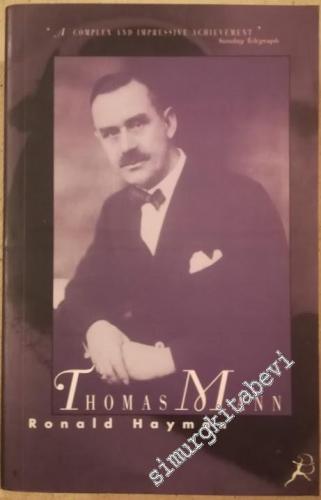Aradığınız sayfa bulunamadı
1199131546
517244

https://www.simurgkitabevi.com/thomas-mann-a-biograpy-1997
Thomas Mann: A Biograpy - 1997 #smrgSAHAF
0.00
German novelist Thomas Mann (1875-1955) played an almost heroic role in keeping German culture alive, and in opposing Hitler, after Germany had surrendered to Nazism; yet this major, dramatic biography reveals a writer who was deeply ambivalent about the Jewishness of his wife, Katia, and who tried, for the first three years of their exile in Switzerland, not to condemn the Nazis publicly. According to Hayman, Mann was terrified the Nazis would get hold of the diaries he had left behind, expose his bisexuality and ruin his reputation. Living behind the facade of married respectability, the guilt-ridden Mann, as the diaries disclose, felt passionate attractions toward boys and young men, including his friend the painter Paul Ehrenburg-though he never "took the step from homoeroticism into homosexuality," in Hayman's analysis. Indispensable for understanding Mann's novels and stories, this literary biography unearths startling connections between his life and work. Prone to convulsive sobbing and fits of nausea, Mann was an aloof father to his six children, two of whom committed suicide. Hayman, biographer of Brecht and Nietzsche, strips away the cultivated mask to plumb a divided soul, "the last great European man of letters" in Hayman's assessment.
German novelist Thomas Mann (1875-1955) played an almost heroic role in keeping German culture alive, and in opposing Hitler, after Germany had surrendered to Nazism; yet this major, dramatic biography reveals a writer who was deeply ambivalent about the Jewishness of his wife, Katia, and who tried, for the first three years of their exile in Switzerland, not to condemn the Nazis publicly. According to Hayman, Mann was terrified the Nazis would get hold of the diaries he had left behind, expose his bisexuality and ruin his reputation. Living behind the facade of married respectability, the guilt-ridden Mann, as the diaries disclose, felt passionate attractions toward boys and young men, including his friend the painter Paul Ehrenburg-though he never "took the step from homoeroticism into homosexuality," in Hayman's analysis. Indispensable for understanding Mann's novels and stories, this literary biography unearths startling connections between his life and work. Prone to convulsive sobbing and fits of nausea, Mann was an aloof father to his six children, two of whom committed suicide. Hayman, biographer of Brecht and Nietzsche, strips away the cultivated mask to plumb a divided soul, "the last great European man of letters" in Hayman's assessment.
Yorum yaz
Bu kitabı henüz kimse eleştirmemiş.














